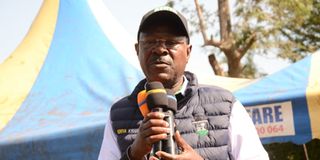Why Wetang’ula could be kept out of Speaker’s race

Bungoma Senator-Elect and Ford Kenya party leader Moses Wetangula.
A constitutional provision requiring Bungoma Senator-elect Moses Wetang’ula to resign first before contesting the National Assembly Speaker’s post threatens to deny Kenya Kwanza Alliance the necessary numbers to secure the Senate Speaker seat.
President-elect William Ruto has a slim 24-23 majority in the Senate. This implies that should Mr Wetang’ula resign, Azimio la Umoja One Kenya Coalition and Kenya Kwanza will be tie at 23 seats each, a deadlock that could tilt the race either way depending on which side would capitulate in a secret ballot.
The provision also puts Mr Wetang’ula in a delicate position as he would be making a political gamble that could see him resign but still lose in the Speaker’s race since neither camp has absolute numbers to guarantee a win.
Kenya Kwanza boasts a slim 161-160 advantage in the National Assembly in the face of a fresh battle to win over 12 newly elected independent MPs, pending four parliamentary races, as well as 12 slots for nominations.
Scramble for numbers
In the Senate, factoring in the 20 nomination slots will still present a tie since UDA is set to grab 10 of the slots with the remaining going to Azimio.
The scramble for numbers has since seen Dr Ruto reach out to United Democratic Movement (UDM) of Mandera Senator-elect Ali Roba. The party, which is part of Azimio has two Senate seats and is set to bag one nomination slots.
Dr Ruto had signed a pre-election deal with Mr Wetang’ula that handed the Ford Kenya party leader the powerful Speaker position.
But there are already discussions to have the outgoing National Assembly Speaker Justin Muturi contest for the seat to avoid a possible gamble that could be costly to the alliance.
“There shall be a Speaker for each House of Parliament, who shall be elected by that House in accordance with the Standing Orders, from among persons who are qualified to be elected as members of Parliament but are not such members,” states Article 106 of the constitution.
According to the House Standing Orders, a Speaker shall be elected when the House first meets after a General Election and before proceeding with any other business other than oath of office by the new members.
Petition
In the face of a petition challenging the outcome of the presidential election, President Uhuru Kenyatta retains the power to convene Parliament’s first sitting, which should take place within 30 days after the August 9 elections.
Constitutional experts argue that Mr Wetang’ula can choose to delay taking oath of office to allow him to participate in the race for the National Assembly Speaker and only make a decision to resign based on the outcome of the race.
This, however, would mean that he cannot participate in the election of the Speaker in the Senate, thereby denying his alliance the numbers.
In the event he takes oath of office as Bungoma Senator, he would automatically be disqualified from the race unless he tenders his resignation, which would occasion a by-election. Taking this route means that should he fail in his bid for Speaker, he could find himself campaigning for a seat he had already bagged.
The election of the Speaker is likely to be influenced by regional and other political dynamics other than political affiliations.
A candidate for the post is required to garner two-thirds of the members – 45 out of 67 in the case of the Senate and 233 of 349 in the National Assembly – for an outright win. But in the event that fails, the two candidates with majority votes in the first round proceed for a second round. The winner is declared on the basis of a simple majority.
Azimio is said to be fronting Wiper leader Kalonzo Musyoka for the National Assembly Speaker and former National Assembly Speaker Kenneth Marende for the Senate seat.
“He has to first resign before participating in the Speaker’s race since being a senator disqualifies him from the race. It would be a big gamble,” said constitutional lawyer Bobby Mkangi.
Homa Bay Senator-elect Moses Kajwang – who is also a lawyer – said some individuals were misinterpreting the law by citing the case of former Speaker Marende, who operated under the old constitution. Mr Marende resigned as Emuhaya MP after being elected Speaker in 2007.
Wrong example
“Mr Marende was under the old constitution and some people tend to give this wrong example,” said Mr Kajwang’.
“It is not a matter of resigning after winning the seat. If he takes the oath he would be disqualified. I foresee a situation where he would probably not take oath of office to allow him to contest. Based on the outcome, he can then choose to resign or not,” explained Mr Kajwang’.
UDA Secretary-General Veronica Maina told the Nation that it was still early to start discussions on the legal implications of the candidature of Mr Wetang’ula. She said that the alliance will consider all factors before making a final decision on the candidate to front for the various House leadership positions.
“Those are issues that will be considered before a candidate can be fronted. I would say it is too early for that discussion at the moment,” said Ms Maina.
Baringo Senator-elect William Cheptumo – also a lawyer – said there should be no cause for alarm over the matter since Kenya Kwanza is an alliance that does not renege on its commitment in reference to the possible perception of a scheme to lock out Mr Wetang’ula from the plum position..
“Legally speaking, someone elected as a member of Parliament cannot run for Speaker unless they resign first. This is the first time when we have a sitting member seeking to be a Speaker,” said Mr Cheptumo.





